Sharon Charde's Blog, page 5
December 10, 2020
ARE YOU OKAY?
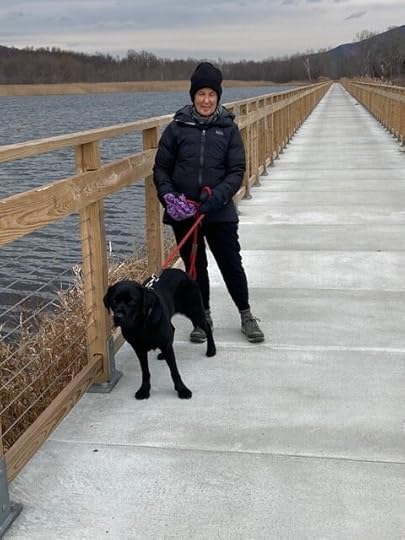
A few weeks ago, Megan Markle, Dutchess of Sussex, asked this question in an op-ed column of the NYT, The Losses We Share. She wrote about the miscarriage she’d had and the terrible grief it brought. She spoke about what it had meant to her, while traveling with Harry in South Africa, exhausted and breastfeeding her first child, trying to keep up a brave front, to have a reporter ask her, “Are you okay?”
She answered that she was grateful to be asked, saying that not many had.
I’ve been pondering that question ever since, wanting to ask it to those of you who read these posts.
Answering it to myself.
No, Megan, I’m not okay.
Not at all.
And I don’t think many of us are.
More than a quarter of a million dead of COVID, a record 3,000 yesterday, the shameless, astonishing, nearly criminal indifference from the current administration, the worry that we or someone close to us could be next to die—how can we be?
A president brazen and depraved beyond wildest imagining, refusing to acknowledge his significant loss in the November election, members of his administration and his party joined with him in this cruel lunacy, his cult followers surrounding the homes of truth-telling, hardworking people with guns and death threats---how can we be?
Holiday traditions shared with relatives and friends, parties and celebrations, the fun of shopping for gifts for loved ones, saying Merry Christmas, Happy Hanukkah, and meaning it—how can we be?
The death of truth, the uselessness of surety.
I know, one day at a time. I know, the only certainty in life is change. I know, I have no control. I know, patience and tolerance for the views of others different from me. I know, how lucky I am compared to most.
But I’m not okay.
Nor are most people I know. One friend wrote today, “I feel like I’m going crazy a lot of the time.” Others describe a numbness, a persistent, debilitating outrage, feelings of despair and pervasive anxiety.
We are rudderless, trying somehow to navigate the formerly unnavigable without compass or captain.
We are lonely, in our safe pods, sheltering in place, so many struggling with children at home mixing uncomfortably with work responsibilities, food insecurity, job losses and bleak futures, Congress doing nothing to help.
Yesterday a friend came to bring me some takeout chili and soup. She is one of the strongest and most resilient women I know. A single mom, she has run the most successful new business in town, a well-attended gym and an adjoining café specializing in healthy, delicious food, along with a massage practice that I’d eagerly supported pre-COVID.
Her landlord is demanding rent, her clients have fallen off, the massage business is almost non-existent, one of her four children is in crisis, and she is doing almost all the cooking for the take-out food that is supporting her now, along with teaching classes to the few who attend and selling exercise videos.
She is hanging on, waiting for the vaccine to bring her business back.
We sat outside for a bit of time, masked and shivering in the freezing afternoon, as I listened to her story. How badly I wanted to hug her long and hard.
She is not okay.
I would like to tell you all, tell myself, that we will be okay one day, as Megan Markle predicted in her op-ed. But I have to say, at this moment, I have no idea if that could happen.
I would like to be able to write a different ending, a more upbeat, consoling conclusion, wish you all a joyful and peaceful holiday season, imagine that you will have one.
It feels wrong not to be able to do that.
But I’m not going to apologize. This is the way it is right now.
What I can offer you is this: I care how you are, and want to hear your story. It may not be a big deal, no wrappings of bright tissue and curly ribbons, no shiny baubles—but it’s what I have right now to give.
Megan Markle thought it was enough.
I hope you do too.
November 15, 2020
They Won, But…..
I’d so hoped to be writing about the joy I felt last Saturday, when I grabbed my Biden sign, held it over my head and went shouting down the street, “They won, they won!” but that elation was short-lived.
The next days have been traumatic.
Two nights ago, I finally finished reading Memorial Drive by Natasha Trethewey. It’s a brilliant memoir that tells of how her stepfather shot and killed her mother 35 years ago, of how she tried to forget and separate herself from that horrific life event for all those years, but could not. It took writing the book to finally help her recover.
Although I highly recommend Memorial Drive, my intention in this post is not to tell you more about it, but of how it pushed me to see even more clearly how we are all bound in a collective trauma right now.
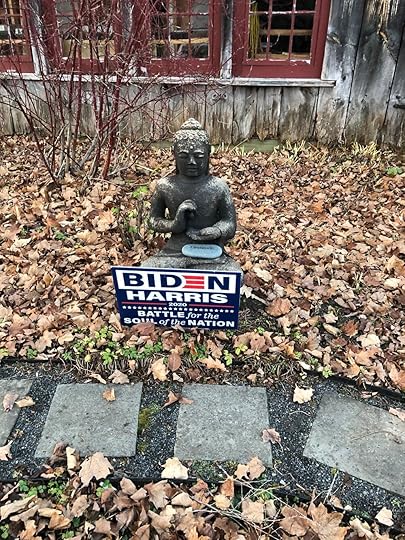
I know trauma. From my therapy practice, from the girls and women in my writing groups, from the many losses in my own long life.
I know the damage it does, the difficulty of recovering from it, the continuing struggle to learn how to carry it differently.
In her 1992 groundbreaking book, Trauma and Recovery, Judith Lewis Herman says this:
Psychological trauma is an affliction of the powerless. At the moment of trauma, the victim is rendered helpless by overwhelming force. When the force is that of nature, we speak of disasters. When the force is that of other human beings, we speak of atrocities. Traumatic events overwhelm the ordinary systems of care that give people a sense of control, connection and meaning.
“When the force is that of other human beings we speak of atrocities.” I dare to say, we are living in a communal atrocity right now. The “other human beings” are, quite simply, Trump and his Republican enablers.
Susan Glasser writes in this week’s The New Yorker:
At times, during this unnerving week in America’s capital, it has felt as though we were watching events unfold in Minsk or some other dictator stronghold where elections are not stolen the day votes are cast but in the weeks afterward, as the defeated President holes up in his palace, defying reality and increasingly urgent crowds in the streets. Here in Minsk-on-the-Potomac, Trump has been perpetrating the Big Lie, claiming the election was stolen from him and apparently persuading millions of Americans to go along with this evidence-free fantasy.
“When the force of that is nature, we speak of disasters.”
The COVID time in which we live now. The almost 250,000 deaths, the increasing cases and hospitalizations, many of which are caused by Trumpian fury at being told what to do—maskless super-spreader gatherings, resistance to wearing masks at all, insistence on living life as usual with bar nights and indoor restaurant meals, family gatherings for holidays, weddings, birthday parties---these stunning refusals to adhere to CDC guidelines are putting so many more lives at risk.
The nation is entering its third, and potentially most dreadful coronavirus surge.
The virus is spreading everywhere.
Just writing these words feels traumatizing.
My family and I follow the rules, though that stings too; we will not have Thanksgiving together this year, tradition now of 25 years at our home. Too dangerous. Christmas will not happen either and how that aches. Two of my grandchildren are having what should be fun, interactive and fulfilling years at college, one remotely and the other masked and mostly sequestered in a dorm room. Now that the weather has chilled there will be no more outdoor gatherings with our son and our friends for many long months. At 78 and 79, my husband and I are in the vulnerable group, so we go few places and pretty much stay home.
It will be a lonely winter.
And the trauma is ongoing. Every day there is a new insult, a new knife to our hope that Joe and Kamala can begin to take over the reins of government, get the daily briefings and meet with the transition teams, bring our country back to some balance, if not normalcy.
So what can we do? I wrote this to a friend the other day:
We cannot let this man take over our lives, our outrage at him fill our heads and push away goodness and health from our hearts. It’s crazy time, for sure, but we don’t have to be crazy too.
Easier said than done.
And getting harder every day.
After my son died, a friend who’d also lost a child offered me some important advice, though it was hard to take, in the very dark vortex of the trauma in which I was immersed and didn’t really want to leave. She told me of her experience: that sometimes allowing distraction from her shattering reality was the thing that most helped her get through the days.
Staying balanced was not even vaguely possible for me at that time, but a short walk was. Sitting outside in the sun was. Crying on the shoulder of a consoling friend was.
Small diversions, but they did offer temporary ease.
Acknowledging the truth of my situation, instead of denying or pushing it away was an important part of the healing that would come much later, as it will for us. Telling the story of how my son died, over and over, was a critical part of that healing as it has been for many trauma survivors and will be for many of us. I became a writer because of it.
But for now, I guess I’m sending you and myself the same messages I’ve been trying to convey with all of these blog posts—be aware, very aware, of what is happening to yourself and the country, stay informed, yes, but find and use those distractions and diversions. They will keep you from the edge of despair.
Try to limit intake of news, get outside into the natural world as much as possible, connect with friends, make soup, do yoga, play board games, donate to Ossoff and Warnock (Georgia senate run-off), rake leaves, get a puppy, buy a new sweater.
The healing can and must wait.
It’s permissible to feel all right about not spending every moment in outrage or regret, worry or panic about the future. More will be revealed as the days move on, but we cannot now know what those days will bring.
Be okay with that.
I’m trying.
Another possible distraction: https://www.eventbrite.com/e/author-talk-with-sharon-charde-tickets-115756612143
I’m doing a talk for the Torrington Library on Thursday about my book, I Am Not A Juvenile Delinquent; I know many of you have listened to my other talks and interviews, and I so appreciate that, but I’d love to see some of you there---I could really use the support.
Thank you, dear friends.
Love,
Sharon
October 29, 2020
GRAVE LESSON
Last week, I went to my son’s grave with the pumpkin I bring him every Halloween. As I do each time I come to him there, I stand quietly and read the inscription it took me a year to find for the stunning piece of Westerly granite that stands guard over what is left of his body.
And think not you can direct the course of love,
for love, if it finds you worthy, will direct your course.
Kahlil Gibran, The Prophet
At age 45, I’d never imagined a task that involved searching for an epitaph for my youngest child’s grave. But that’s what I was faced with thirty-three years ago. I wanted it to be just right-- right to memorialize Geoff’s loving, generous and inclusive spirit, right with inspiration that might touch the hearts and souls of those who read it. And right in that it could ring again that raw bell of deep loss as well as challenge me and others to see the beautiful and crazy impermanence of living caught within the paradox of his dying.
The painstakingly hand-carved inscription always calms me, settles me into a place of balance and acceptance, just as I had hoped it would all those years ago. Gibran’s words (although I now think of them as Geoff’s message to me) feel like the perfect message for this week, these last few days of anguished, anxious waiting for the answers November 3 will bring.
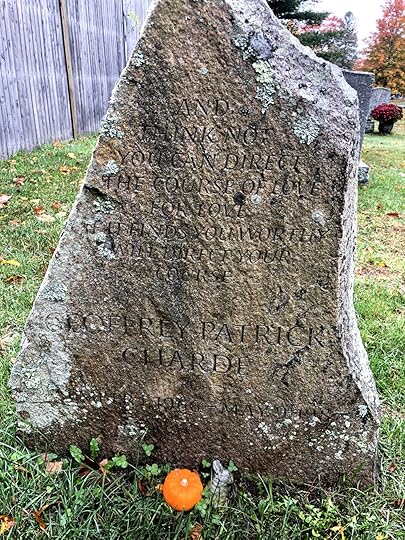
Mom, it’s okay. I’m okay. I know how much you miss me and didn’t want me to die. I know you can’t see much clearly right now, but just hold on to your love for me and mine for you, and the blurriness will uncloud, a path will open and you will find another direction.
“Pick anything you want to believe,” a friend said to me at the reception after Geoff’s memorial service.
For right now, I’m going to believe in Gibran’s words, in Geoff’s message from whatever slice of the cosmos he resides in now, so far from our troubled world. And share them with you, my friends, for these last grueling days before we know the next gauntlet that will be thrown down to us.
It’s hard to have faith in much as we struggle with the what-ifs and if-onlies of this unique patch of history we inhabit, but right now I‘m deciding to take Geoff’s promise in deep once again.
And think not you can direct the course of love,
for love, if it finds you worthy, will direct your course.
Be well, take walks, eat chocolate, hug the ones you love-- and try to remember this.
With love,
Sharon
October 7, 2020
OASIS
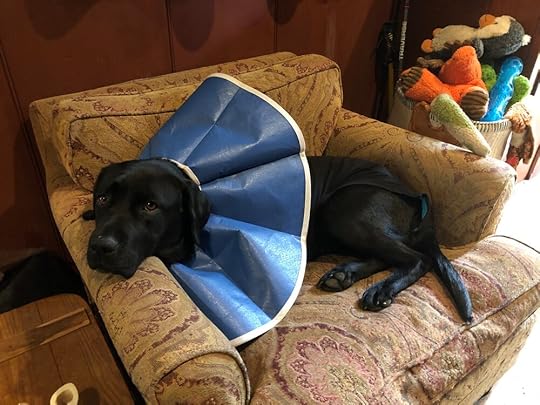
This is Stella, a day after her surgery (she was spayed, a routine procedure but nonetheless traumatic for both of us). I sent this picture to a friend and she responded, “That’s exactly the way I feel right now.”
I think many of us, too, can relate.
It’s hard not to feel despondent about our lives, our losses, the pain of the world.
It’s exhausting to try to digest the daily doses of outrageousness that assail us on our devices, on television, in the very air we breathe, especially and literally for those living in the western part of our country.
It’s bewildering, like it was for Stella, to comprehend the now-surreal nature of the world to which we were accustomed, that turned steadily and reliably on its diurnal axis.
If any of us did not believe that impermanence was the only sure thing in our lives—that we truly have no control---now is certainly the time to completely surrender that disbelief.
Like Stella, we need time to heal, but there’s no rest from the assaults we’re bombarded with.
Every two weeks, Bret Stephens (conservative Republican) and Gail Collins (liberal Democrat) have a discussion published as an op-ed in the New York Times. I always find some solace in it. Here’s what Bret had to say in the last one:
Bret: You know, Gail, as we approach this final sprint, my prevailing feeling is that I’m so sick of it. Sick of living in Donald Trump’s Clownverse, or Dramaverse, or Bullyverse, or I-Can’t-Believe-This-Guy-Is-Actually-the-President-verse. On Tuesday I watched a debate between an upright but uninspiring candidate with whose views I usually disagree, and a guy who made me want to stuff my fingers in my ears while I cringe for my country. A former colleague of ours, Rick Bragg, once wrote a heart-wrenching memoir, “All Over but the Shoutin’,” and the title really seems to fit where we are. If Biden gets elected and does nothing except lower the national decibel level, he’ll earn a spot on Mount Rushmore in my book.
A holy yes to that.
Another friend, or maybe it was the same one who said Stella’s sad face resonated with her own despair, says we’re all suffering from PTSD. I agree. And PTSD can be a magnet for all the other troubles and losses we’ve experienced—many women friends of mine have also been triggered by Trump’s violent verbal abusiveness especially in the last debate, and those of us who grew up in dysfunctional families feel like we’re back home again.
The spinning never stops.
Off kilter, constantly outraged, stressed to the max, I knew I needed to find a way to get my balance back.
Many of you know that since 1992, I’ve been a practitioner of mindfulness. My son’s death and my inability to keep my grief from making my life a grim shadow of its former self led me to my first meditation retreat at the Lama Foundation near Taos, New Mexico. My new memoir, I Am Not A Juvenile Delinquent, tells that story and how the path of mindfulness taught me difficult lesson after lesson as I tried to navigate the challenging waters of a turbulent residential treatment center and its young inhabitants, and continues to as I cope with aging, the pandemic and its isolating, frightening confusion, and the current surreal political situation.
The Insight Meditation Society in Barre, MA, where I’ve done most of my retreats, sends out a monthly sangha newsletter. Since they’ve had to close indefinitely due to COVID, I’ve been unable to go to my yearly retreat at The Forest Refuge there. Neither, of course, has anyone else, cutting off both IMS’s source of financial support and ours of spiritual succor. They’ve coped with this by offering a series of online retreats—obviously lacking the seclusion and transport to a calming, nurturing place free of distraction—but as my husband often says, “the perfect is the enemy of the good,” and they were surely better than nothing, I thought.
“Down To Earth Dharma: Buddhism From A Feminine Paradigm,” caught my eye in the latest newsletter. But I didn’t sign up for it until the very last minute, the day before it began. I resisted. It seemed like it would be really difficult to do it at home, with all the distractions of my husband, Stella, the computer, the laundry, the garden, and all the other expected interruptions of life at my house; but really, it was hard to admit how much I needed its potential healing, as Stella had needed hers.
I think it was Trump getting the virus that forced me to click “register.”
I’d had enough of the craziness.
I’m just finishing up the five days now—and what an oasis it has been in my formerly spinning world. The teachers have been stellar, the renewed realization that mindfulness is “advanced common sense,” as one of them put it, and the comfort I’ve received in mega-doses, all have brought my footing back. Guided meditation sessions, dharma talks, movement and yoga sessions, walking in the woods with a recovered Stella, just sitting still, away from the loud voices of phone, Ipad and TV, have returned me to my heart.
I can breathe again.
I woke up last night from a dream in which I was singing an old camp song—mind you, I’ve not heard it in 60 years---and its words seem a good way to end this post.
How much I wish this for all of us.
Peace, I ask of thee, oh river, peace, peace, peace.
When I learn to live serenely, cares will cease.
From the hills I gather wisdom, visions of the days to be---
Strength to lead and faith to follow---
All are given unto me.
Peace I ask of thee, of river, peace, peace, peace……
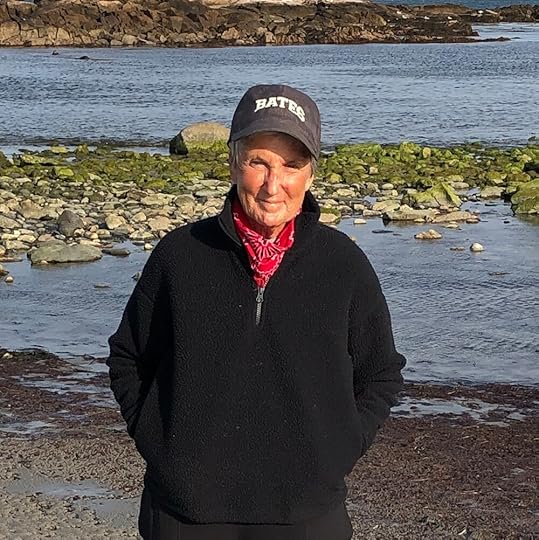
Sending love as always,
Sharon
September 10, 2020
SUSPENSION
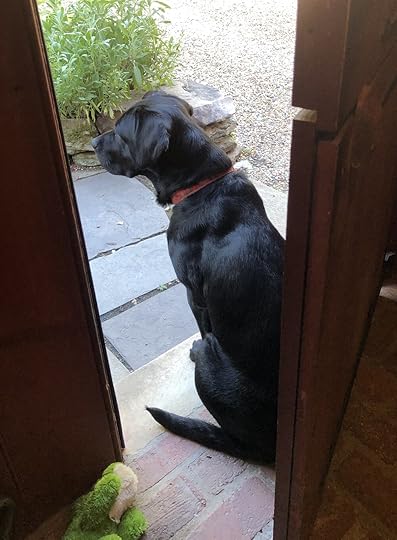
That’s Stella, our black lab, every morning. Our friends love to climb the trail near our house and they often come with their two labs and pick her up to hike and swim with them. But they don’t come every day.
No matter, she waits each morning, laser-focused on the driveway, ears attuned to the particular sound of their Subaru Outback. After her breakfast, there is only one thing she cares about.
When they do drive in, tires crunching the gravel, Stella is ecstatic, running to the car, leaping into the air with wild joy. Upon arriving home, she, usually soaking wet, treks reluctantly to the door, gets toweled off by one of us and snoozes on her chair for the rest of the morning, totally satisfied.
The next morning, she’s in the same place again.
That picture stays with me. It captures something I feel right now, that of being suspended, hanging on, waiting for something to happen in what feels like the daily war we are living in.
But what?
November 3?
A vaccine, vetted of course by Dr. Fauci ?
A book or an article in the NYT, Washington Post, Atlantic, New Yorker, that will finally be what brings Trump’s campaign to its knees?
Being able to see and hug my son and his family?
The unfortunate end of summer, with it the chilly nights that will make gathering with friends outside impossible?
Our brief trip to the Rhode Island shore, a hoped-for sojourn to Maine?
Feeling the creative energy that will get me to open files of poems and begin creating a new manuscript?
The results of a positive COVID test and what that would mean?
Dying?
Too dramatic, you might say, the last one. But as my Buddhist teachers observe, waiting is simply life’s practice for our eventual deaths.
I’ve had so many ideas swirling in my mind about what to write this time, if I could even get out of this suspension mode and into a functioning one. But I keep succumbing to the bombardment of articles and conversations about the current political situation like this one by Peter Weiner in the Atlantic the other day, exquisitely describing those on “the other side”:
…..in the minds of Trump’s supporters lingers the belief that a Biden presidency would usher in a reign of terror. Many of them simply have to believe that. Justifying their fealty to a man who is so obviously a moral wreck requires them to turn Joe Biden and the Democratic Party into an existential threat. The narrative is set; the actual identity of the nominee is almost incidental.
Or this one, by Heather Cox Richardson:
Earlier this week, New York Times columnist Farhad Manjoo warned that American democracy is ending. He pointed to political violence on the streets, the pandemic, unemployment, racial polarization, and natural disasters, all of which are destabilizing the country, and noted that Republicans appear to have abandoned democracy in favor of a cult-like support for Donald Trump. They are wedded to a narrative based in lies, as the president dismantles our non-partisan civil service and replaces it with a gang of cronies loyal only to him.
He is right to be worried.
As am I.
Or another by John Cassidy in the New Yorker :
It’s been two days since The Atlantic published an article claiming that Donald Trump had called U.S. service members who died in combat “losers” and “suckers,” and the uproar over the story hasn’t relented. Other news outlets, including Fox News, have confirmed various parts of the story, while some current and former members of the Trump Administration have called parts of it false. The best way to resolve the controversy would be for John Kelly , the highly decorated military veteran who served as Trump’s chief of staff, from 2017 to 2019, to say publicly what he knows. He ought to do this without hesitation.
I agree. Of course. I want to think it could make a difference, make people strip the blinders from their unwilling eyes and SEE.
Huh.
Anyway, his silence is telling us all we need to know.
August 14, 2020
KAMALA

I’ve felt so depleted for the last few weeks that I’ve not been able to summon the energy to write a new blog post. I had wanted to write about John Lewis and his challenge to all of us to build what he called the “Beloved Community,” to get into “good trouble,” and the need for us to stand up for what we really believe. How important it is to tell the truth. Bush and Clinton, as well as the others who spoke at his funeral were so eloquent and inspiring, and I cried to hear and see Obama, to know so deeply what I’ve been missing. I wanted to hang on to that feeling of inspiration and yes, love. And to share it. But then the funeral was over and we were back to gratuitous bullying, idiotic tweets, deadlocked Congress, Qanon-believing potential Congress people.
I finally began a post calling my feeling by its name--- “Depleted,” ---finished yesterday. Here’s how it began:
When my labs were puppies, I would buy them adorable stuffed toys—monkeys, squirrels, pheasants, even fish. The toys always had squeakers inside, and the first thing the pups would do (when I wasn’t looking) was to try to tear the toy apart, rip out its stuffing to get to the squeaker they, for some reason, seemed to prize. I would carefully put the squeaker and stuffing back into the squirrel or monkey, and get out the ancient sewing kit my mother made for me when I got married. Needle threaded, I would sew the rent fabric back up as tight as I could.
Of course, the pup would do it all over again.
I wrote that I felt my stuffing was being torn out—by the pandemic and its stripping of options from our lives, by the fascist monster in the White House and his minions, their cruel travesties against the American people and the stream of lies that pour forth from their mouths daily, by the swelling underbelly of racism in this country that is now becoming mainstream. Then came storm Isaias, which hit my state especially hard and knocked out power and internet for more than a week.
It all seemed like too much. I feared for my squeaker—the stuffing rippers were almost there.
Then came Biden’s announcement of his VP.
I had been hoping he would choose her. I love Susan Rice, but she had too much exploitable baggage. All the rest of them were great too but each had issues that could easily be abused by the Trump campaign and Trump himself, Abuser-In–Chief.
Kamala. A woman! A woman of color! Of course, we’d known about the woman part, but to actually have it confirmed, to see them together, to hear her fabulous speech, feel her vitality, her energy, beauty and skill with words—her woman-ness--it filled me up again.
I grew up in the forties and fifties, in a traditional family, a very Catholic and conservative one. Women were chattel, owned by men, children were seen and not heard, girls were “less-than.” We knew boys had and would grow up to have more power than we did—all we had to do was look at the world, ruled by men—priests and bishops, doctors and lawyers, bus drivers and store clerks, presidents of colleges, principals of schools full of female teachers, Congress, judges, and of course, the president, vice-president and entire cabinet. After college, I taught in an inner-city girls’ Catholic high school of 6,000—6 orders of nuns, 11 female lay teachers, and who was the principal? Father Friel. Same in my grammar school, Father Colton, although my high school and college were led by woman—in the case of college, a very strong and brilliant woman, Sister Margaret. But they were the exception.
In my world, fathers ruled our households while most of our mothers scrubbed and cleaned, vacuumed, did all the childcare, and prepared meals that were seated only when the man of the house arrived home. Women could hope for marriage as a future, borrowing power from a man’s prestige and standing, especially if they were pretty. Nurse, nun or teacher, were the available options for women’s work, if in fact husbands even allowed the wife to work outside the home.
The texts and poems we read in school were all written by white men. We call them dead white males now, and laugh, but it was my reality then.
It was a grim world for girls in many ways, but we knew no other, as there were no female role models in positions of power.
I was aware even then, I did not want a future like my mother’s life, though I married young to a man I loved. We had been equals in every way when we met and dated, but the labels of husband and wife, as well as the birth of two sons in quick succession and his nascent medical career thrust us into similar traditional roles. I did teach until I was let go for being pregnant (in a Catholic school!) but then opted to stay home with my boys, not wanting the influence of a caretaker to replace my own.
So there I was, in my mother’s life--- sort of, anyway. The difference was of course that my husband was not the autocrat my father had been, though his studies left little time for sharing housework, cooking and child-care.
I railed against it all, in love with my two boys and my husband, yes, but yearning to see women in positions of power and to feel some of my own. Then came the women’s movement of the seventies---I was a charter subscriber to MS. Magazine, and avidly embraced the tenets it espoused. Finally, shreds of hope.
But as we all know, change has been much too slow. I’ve devoted my entire professional career to creating women’s community, supporting women’s voices and belief in women’s strength and power, trying to achieve it in my own life as well as in those of other women. And I’m proud of all whose lives I have touched and those who have touched mine.
So. All this backstory underlies my pure joy in Kamala’s elevation to the VP-elect. To see a woman my son’s age, full of brilliance, vitality, authenticity and beauty, that radiant smile, partner with a man I respect to seek the two highest offices in the land, gives me such hope. The thought that they might be able to unseat the illegitimate monster who soils the Oval office with his presence is enthralling and energizing.
A woman in the White House! Yes!
Those of you who have read I Am Not A Juvenile Delinquent know I speak of hope as dangerous, and it is. Wishing or dreaming or praying does not make a thing happen, expectation is risky and foolish---but I’m going to indulge for a bit, let myself be inspired by this glorious possibility.
For now, my squeaker is safe, in this nest of fresh new stuffing.
July 20, 2020
Outrage, Again
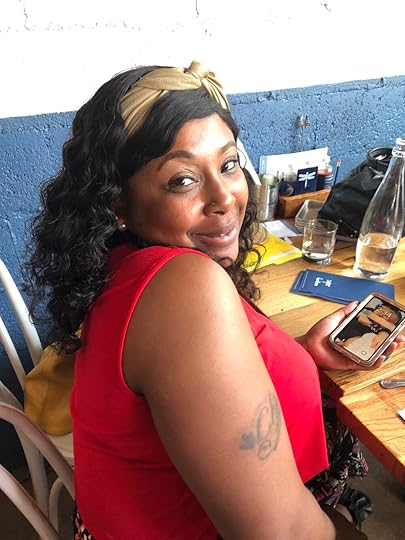
I was going to write about something else for this post, even had it started—the wonderful Wyoming School For Girls where I made a connection when I was out at Ucross Foundation for a residency in March. I’ve been doing writing workshops with them on Google Hangout, and I wanted to tell you about how much they’ve meant to me and seem to mean to the girls incarcerated there. The director, Dixie Fox, with whom I’ve been dealing over the complexities of doing such an intimate experience virtually, is a stunning example of what a facility for troubled girls needs in a leader. I am mightily impressed with her and hope to continue to volunteer as a writing group facilitator with them until I get back to Wyoming, hopefully next spring. It feels so good to be able to reach out to these young women with all the poems and stories of my girls and know how inspired they may be by them; how I have missed this work.
But that story got pushed aside for the moment when this morning’s phone exchange hijacked all my focus. I’d been wanting to call Chim’ere, one of “my girls”(those of you who’ve read my book will remember her as one I featured), and finally sorted through all the changed phone numbers she’d given me over the years to find the right one and click on it.
“Hi Sharon!” she warbled in that melodious voice of hers. “Guess who’s sitting right next to me? We’re going to get some breakfast and then to Newington to pick up my new car and get her rental.” Chim’ere’s boyfriend had totaled her last car, in addition to smashing her TV, breaking the windows in her house, stealing money and expensive sneakers from their children to buy drugs—he’s the one she said she was going to leave in the book. It hasn’t happened yet.
“Sharon it’s me, Tarray.” (You will remember her from a few posts ago and the book as well—that they’d been friends since middle school).
“Tarray, Chim’ere! I am so happy to get you both. Double joy, double trouble…” We all laughed.
“But Chim’ere, it’s really you I wanted to talk to this morning; I need to know you’ve left that guy in the dust.” She’s texted me a few days ago that she’d called Chrysalis, the domestic violence organization where she lives, and that they were helping, that she’d gotten a restraining order on him. I had hoped she wasn’t just saying that to make me happy and wanted to hear that in her own words.
They both began talking over each other. Chime’re said the boyfriend wouldn’t help at all with finances and would not “babysit” for the children (his children) but that he’d given her a $1500 engagement ring and $1000 diamond earrings since the restraining order. I didn’t even want to think about where he’d gotten the money.
“Sell them and use the money for a responsible babysitter!” I yelled over the din of their strong voices. “You don’t want to leave your children with a drug addict. My god, Chim’ere.”
“I know, Sharon, I know. Muhlanie (her oldest daughter) says I should pawn them.”
“Yes, I agree, do it! Get rid of him, he’s bringing you nothing but pain and suffering. Stressing you out, affecting your health and well-being. No possible good can come of this relationship unless he’s years in rehab. And maybe not even then.”
“I know, Sharon. I have to do it.”
“I know it’s hard, I know, it’s like an addiction—I know, I know, I’ve been in unwise relationships myself where I rationalized that the person would change. Never happened. Sometimes we can all be so blind.” This is one of the things I’ve loved about my kinships with the girls—I can express my outrage, pain and disappointment, share my own experience in a way I never could as a therapist, in that boundaried, asymmetrical, working relationship. But in the freedom of our love and respect for each other I can say anything, as can they. I can swear and yell just like they do, and as we all did large amounts of this morning.
“Sharon, the worst, worst thing that has ever happened to me happened last week. I have to tell you,” Tarray interrupted.
“Oh god, what now?”
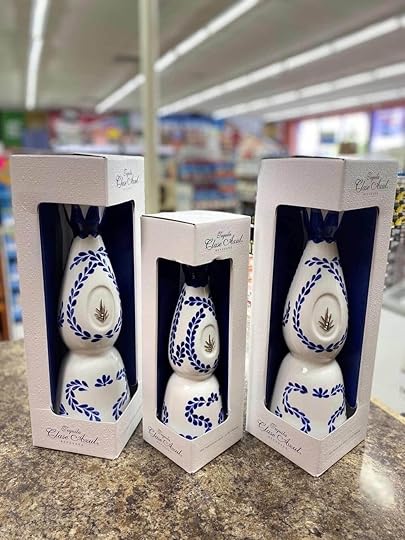
“I wanted to get my girlfriend a bottle of Clase Azul tequila for her birthday, it costs $150 a bottle, she loves it. So I go to Total Line (I interrupt to ask what Total Line is as I’ve never heard of it and she tells me it’s a big store with everything and good prices on liquor)—I decide to go to the one in Manchester where I think I’ll be less harassed, instead of West Hartford—we go in and I pick out the bottle, get in line after she says she’s leaving, going to Marshall’s and will meet me there. I put the bottle on the conveyor belt, get out my ID and debit card, and the cashier guy says he won’t sell it to me!”
I know right away without her telling me, that he’s a white guy. Tarray is black, for those of you who don’t remember. Not only black, but large and imposing, with long dreads under her backwards baseball cap, men’s shirts and shorts and wildly expensive sneakers. Tattoos too. Simply gorgeous.
“Why, I say? What’s the problem? I’ve got money, I want to buy it.”
“Leave the store,” he says. “I’m not selling it to you.”
“I keep asking him, why? Is it because I’m black?
“What did he say?”
“Nothing, just turned his head, said it again, ‘I can’t sell that to you.’
And all around me, a crowd is gathering, watching. They’re all staring at me.”
“Did anyone do anything, say anything, try to help you?” I ask, my outrage boiling over, imagining what I’d do and say if I’d been there.
“Nope. No one.”
“I can’t understand how he could deny you service with no reason, I just can’t. This is outrageous! And no one tried to help you? Did you ever get any reason from him?”
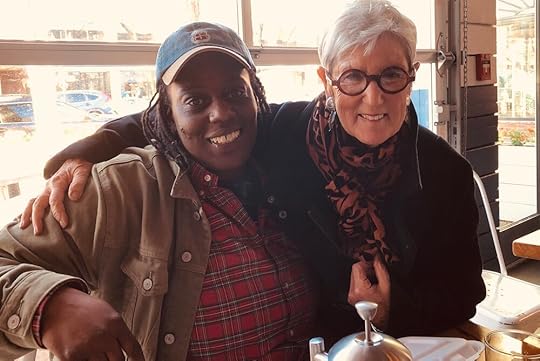
“He finally said something about ‘that girl who was with you’—but she didn’t do anything—she had already left.”
“Do you think he thought she’d stolen something? Was underage?”
“I don’t know, Sharon—and anyway, why would that mean he couldn’t sell to me? She wasn’t even with me.”
“I know, of course.”
“I kept it up, kept saying it was wrong what he was doing, it was because I was black—he was a little white dude—I wish I had filmed it-- everyone standing around watching…I ended up leaving, going to the Total Line in West Hartford, had no problem there. I think it’s a class issue too…“
“Yes,” I say. “For sure. The guy in Manchester needed to feel superior to you—he was insecure and afraid, so he lashed out at you, made a power play, to make himself feel better about being a jerk.”
“Yeah, Sharon, and in West Hartford—like when I worked in Westport—there are rich people there—they already know they’re superior so they don’t have to act that way towards us.”
“Can you write about this, you need to write about this! The white world needs to hear the insane, every-day injustice you guys go through! None of us comprehend the pain of your lives!!” I yell.
“No Sharon, I’m too angry to write, I just want to talk about it, tell you.”
That’s when I knew what I’d be writing this week.
***
Here’s the latest reading for “I Am Not A Juvenile Delinquent,” A FB live stream with Donna Hemans last week: it was great!:
https://www.facebook.com/vacenterforthecreativearts/videos/277556357017814/
YouTube: https://www.youtube.com/watch?v=vRl2-LDnVJk
And thank you so much, everybody, for reading the book and sending such great responses my way. I’m working hard on publicity, along with Lesley Budny, my wonderful former staff support at Touchstone, who is now a marketing and publicity person with skills she’s offering freely to someone without them. I am so grateful to her.
I am hoping those of you who’ve read the book will write an Amazon review—the publisher wants them as they boost sales. It’s easy and I would so appreciate it!! And for those of you who are waiting to get it:
June 25, 2020
THE BOOK IS OUT!
There is a line from the group poem “I Am Not A Juvenile Delinquent,” in my newly published book of the same name, that declares “I am happy turned to sad.” I read that poem in my hour-long Zoom launch interview sponsored by our wonderful local bookstore, Oblong Books in Millerton, New York on Thursday June 18, to which many of you listened. Thank you so much. The link to the interview is here for those of you who missed it:
https://drive.google.com/file/d/1eXshuT8g5AIfvR-uCNmI-EWiGg5tY0qH/view?usp=sharing
And “happy turned to sad,” is how I’ve been feeling since my last blog post. The book is officially out and in the hands of many readers. My sister just texted that she’d hated to finish it because it was so good. Others have told me it made them cry, was a real page-turner, tough to put down. That’s hard for me to take in. Really? But I look at the book, shuffle its pages, and feel—yes—happy. The book I’ve tried for years to bring into the world has arrived. And people are positive about it and its message. Filled with the voices of a marginalized population, I Am Not A Juvenile Delinquent, How Poetry Changed A Group Of At-Risk Young Women, it feels like a perfect book for this wrenching time in our country, when listening to those voices is more important than ever.
That makes me happy.
But at the same time I am also filled with the same sadness I felt when I was in the rooms with those I call “my girls,” listening to their stories all over again, crafted into poems like this one by Miranda.
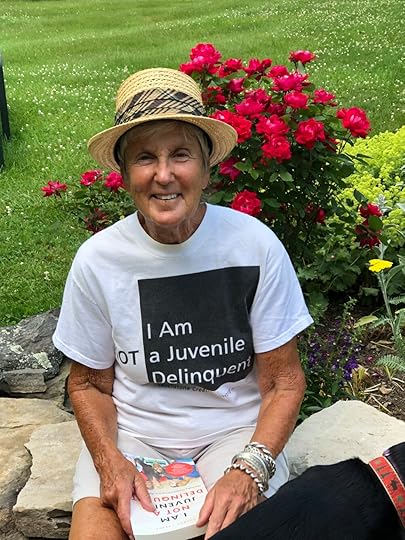
GIRL, LISTEN
you’ve heard of it
I’ve tried it
I’ve been there
I’ve done that
girl, listen
there’s nothing you can say or do
that will make me judge you
not care for you
or even forget you
I’ve gotten high on weed
and moved on to worse drugs like meth
I’ve had sex
believe me I’m no angel—
and when the pregnancy tests came in
I cried because of the results
I’ve been raped before
I’ve been called a slut
I’ve been called a whore
I’ve been arrested for assault
yeah, that’s right
I got high and pulled out a knife
I lost my mom
at the age of nine
and then two weeks later
my grandpa died
I used to lie
I used to steal
I’ve run away
I’ve been restrained
(that was just yesterday)
and not too long ago
I hung and tried to kill myself
so what I’m going to do
and I hope you do too
is don’t give up
because there ‘s a lot in life we need to achieve
life will get better
we just have to believe
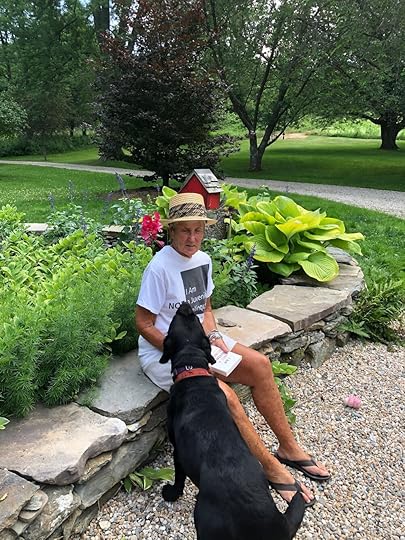
Martha had asked me to read that poem during our Zoom interview; she thought it captured a necessary message to the world, shouting out as it does, the painful history of just one young woman. Multiply that voices by thousands, millions. See them marching in the streets, crouching in alleys or bathrooms as they shoot up, sleeping in homeless shelters or squalid overpopulated apartments or houses. See their despair, their confusion, their rage.
We just have to believe.
But, Miranda, I’m having trouble believing in much of anything right now, as the coronavirus continues to ravage our country, the social safety net is shredded, the unhinged man we have for a president seems to become more unhinged every day. His loyal cult preaches personal liberty as it refuses to wear masks or practice social distancing, crowds beaches, bars, and rallies. I know, I know, it’s awkward to negotiate familiar relationships, face covered up, six feet apart from unhugged friends and family, I did it last week when at last we were able to see our grandsons, son and his wife. But we have to, we must—for each other. It’s a lot like learning the steps to a new dance, a dance that could make the difference between life and death for many. A dance of kindness and respect.
We just have to believe.
Life has gotten better for Miranda, thankfully. She is doing well, clean, the mother of four beautiful little girls. She worked hard to get where she is and I’m so proud of her.
That makes me happy.
A wash of guilt, a rush of joy. Happy turned to sad. Contradicting feelings banging up against each other. How can I be happy when the world is spinning out of control, when so many live in misery and despair that things can ever change for them? How can I be sad when my life is so fortunate, a broad green yard, a black dog, a husband who cooks dinner every night, good health and my memoir out in the world at last?
Maybe it doesn’t have to be either/or.
We just have to believe.
June 9, 2020
Smooth Pain
“I’ve been wanting to talk to you about a few ideas I have with all the things going on in our country,” Tarray messaged me yesterday while I was thinking about what I would write this week, knowing no white woman’s words could be as important as hers and theirs---my Touchstone girls, their poems and stories about violence and abuse in their black and brown lives, my passion to get them out into the bigger world. How I’d wanted the privileged milieu I inhabited to grasp what labeled these young women as delinquent—I wanted them to understand what led them to do the sometimes lawless stuff they did, the drug use and selling, the prostitution, the truancy, the assaults. That’s why I’d brought them to so many reading venues, started the joint group with The Hotchkiss School girls, tried so long and hard to get I Am Not A Juvenile Delinquent published. And now, why I’m rejoicing that it has been, especially now.
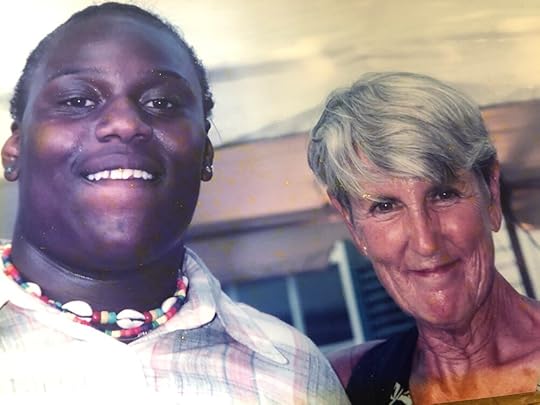
I realized that what I needed to do was share some of the poems in the book with you. Let them speak what I could not. Tarray’s came first to mind:
SMOOTH PAIN
my pain you can’t touch
it’s untouchable
even I can’t touch it
I can only feel it
it’s a smooth feeling
smoother than a baby’s ass
smoother than teddy pendergrass
yes, but pain
pain when I walk
pain when I move
just smooth pain
sometimes people say
pain will heal
mine hasn’t yet
it feels like the pain
my ancestors went through
it feels like the pain of a starving child
in the middle of the street
the pain of an old man robbed
of everything even his socks
the pain of the world
more pain
less pain
smooth pain
The phone rang. It was Tarray. “Sharon, what’s happening now—it’s been my whole life. It’s just what I expect. The cops see me and stop me all the time for nothing.”
I felt the outrage in me getting out of hand again. “That is just so wrong, so wrong, so wrong.”
“Don’t worry Sharon, I can handle it.”
That’s what they always told me when I expressed horror at what they had to deal with.
“Tell me what happens when they stop you?”
“The cops in West Hartford especially bad. Out at Bishop’s Corner. I like the Marshall’s out there, so I pull in and park, notice the cop behind me. I walk into the store, then come out to my car, and sit there, texting someone before I get going, not wanting to do it while driving. The same cop comes over to the car, asks me what I’m doing. He’d been watching me. I show him the phone, tell him I’m texting. Ask why he’s asking me, anyway.”
“You have tinted windows,” he says.
“What?” I yell into the phone. “What’s that about?”
“They suspicious. He asks for my ID, runs it, sees nothing, maybe he’s disappointed. Sharon, it happens all the time. I’m used to it.”
“This is so outrageous. What would happen if I was with you, say in the car, or in a store?”
“Oh, they’d follow us, ask you if everything was okay, look at me when they said it. I can’t even go into J. Crew, or Brooks Brothers, I love that store! I’d be followed the whole time I was inside. (Tarray is a big, imposing black woman who loves fashion and style, has long dreads that stream from under her signature backwards baseball cap, dresses in Ralph Lauren men’s shorts and shirts, top of the line sneakers). The cops even follow me when I go to the Marshall’s out in Avon—they have better stuff out there, so my grandma and I used to go a lot and check it out. And Sharon, when I went down to live in Georgia to help my grandma when she was sick---oh, they were so much worse. I bet they followed me every time I went out.”
“Oh, Tarray. I love you.” Sometimes I just didn’t know what else to say.
Here’s another one of her poems from the book:
MY KITCHEN TABLE
my kitchen table is the hangout.
we don’t eat there but we express ourselves there
How many kids does so and so have?
How many times have the bill collectors called?
How much is the phone bill?
that’s the food on my kitchen table
we eat the gossip in the air
we eat our wisdom at the kitchen table
not the wisdom of books and school
but the wisdom of the projects,
welfare dick, fast cars, drug money--
our kitchen table is as well-rounded
as if the Mafia were there
fuck my kitchen table
there’s nothing there to eat
I’ve been eating the same shit there forever
I want different foods at my kitchen table
no gossip or shit from the streets
I want the food of books and school
how to make it
I want to digest the food at my kitchen table
let it move through my system
return again at the table
fuck the food at the projects, welfare dick,
fast cars and drug money
I want some new food at my kitchen table
There was a local protest for Black Lives Matter in my small Connecticut town a few days ago. One woman held up a sign, “WHITE PEOPLE, DO SOMETHING!”
Can they, will they, hear Tiffany’s words as a call to action?
PREJUDICE
Our blood is the same--
so are our tongues.
We all breathe the same air
and like to have fun.
So what makes you different?
What makes you dislike me for the way I look,
the way I dress, the color of my skin,
or the way my momma cooks?
Why can’t you see who I really am inside-
a person who loves, who hurts,
a person who gives, a person who cries.
All you seem to see is the color of my skin,
the size of my nose, the length of my hair.
When it comes to the weight of my heart
you really don’t care.
Our outer layer doesn’t really matter.
What’s important is what’s within.
Love your neighbor for what’s inside.
Be their true friend.
I want to believe they can and they will. We will listen, this time.
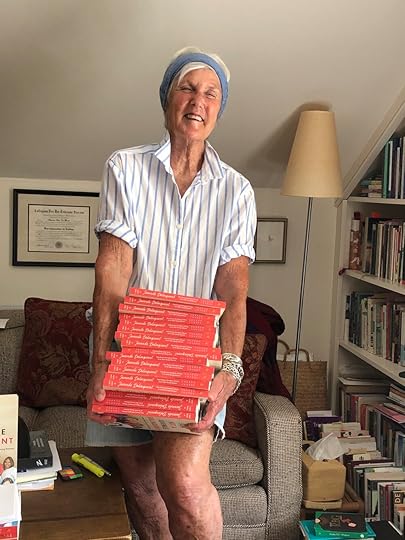
If you want to hear and read more about Tarray and Tiffany and the many other girls in I Am Not A Juvenile Delinquent, I will be in conversation about it with my friend Martha Toll on Zoom, June 18 at 7. You’ll be able to order a book then.
Follow this link to register for the Zoom event launching the publication of my book, I Am Not A Juvenile Delinquent, https://www.eventbrite.com/e/sharon-charde-i-am-not-a-juvenile-delinquent-tickets-106262802904
I am so grateful to all who respond to my blog, and ask forgiveness for not being able to respond to all of you in a timely manner.
May 25, 2020
Waiting
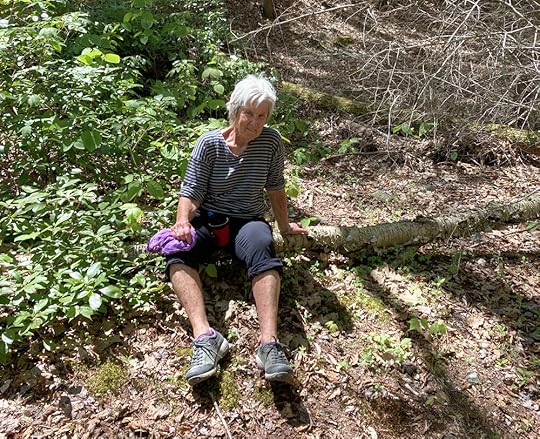
I was waiting to do this post until I got my books and could write about how I felt when I opened the box and actually saw them—the real thing—not the copied pages, the ARC, the digital version—but they haven’t yet arrived.
As I was sitting outside for a brief respite from the computer, dreaming a bit in the sun, all the other things I was waiting for flooded my mind—the arrival of those books, a haircut appointment, word from Politics and Prose about a hoped-for Crowdcast video for I Am Not A Juvenile Delinquent, for the overgrown lawn to be mowed, for the grass seed in its bare spots to sprout, for my puppy Stella to finish her heat, for the time and energy to clean up my thousands of emails, to write a new poem, to put together another poetry collection.
I’m waiting for a day when I can feel better about what is happening in the world, when the news won’t spew one awful report after another, one more pile of lies and ugliness, another cancellation, venomous tweet or higher death tally. I’m marking time until I don’t feel like I’m locked in a room with a madman. November 3 can’t come soon enough for me—of course, only if Democrats displace that madman and the other ones in the Senate, the cronies and phonies who are doing what some call governing during this terrible time of COVID. I am not able to get my mind around what the further devastation to our world would be if the Democrats don’t win.
Sometimes I’ve felt like my life was a waiting room— that I’m just biding time until the work of living is done. As I do my yoga routine, I’m thinking of what to have for lunch—as I put away my winter sweaters and take out my tee shirts and tank tops, I’m already thinking of that new fall jacket I want to wear—as I take my daily walk I’m thinking of the glass of wine I’ll have when I get home. Always ahead of myself. At the end of the day, instead of feeling a sense of completion I agonize over all I did not get done.
This waiting, this catapulting from the present moment to whatever I imagine is coming next, keeps me from paying attention to the budding allium, peonies, the blooming lilacs and the daffodils—making them past history before their brief lives are even half over. I’m not fully present to my husband’s enthusiasm about the baby bluebirds nesting in his garden or the kale and lettuce that’s beginning to sprout. I’m not seeing the mustard springing up in the back field or the gorgeous color of the leaves on my new copper beech.
I know I’m doing it. I know. It’s so hard not to.
And like all of us, I’m waiting for this confusing period in our lives to move into some kind of transition——when my grandsons can have a college experience that resembles normalcy, when I can actually see and hug them, go out into the world and interact with others without the inevitable self-consciousness that comes with masks and social distancing.
Last night I dreamt, in vivid detail, though I cannot now remember much of it, that I’d gotten the virus and was in the very beginning of being ill with it. The feeling I most remember from the dream is relief. I found that fascinating. The dreaded enemy had arrived and I was face to face with it. No more waiting. It would do what it would do in my body, and I would recover, or not.
But that was a dream The wait now is to see if I’ll get it, or my husband will, and just get all this protecting from it and preparing for it over with, plumb the mystery of this dreaded virus. Otherwise the vaccine could be years away and life with masks, social distancing, virtual connections and the need for creative solutions to things we long took for granted would become the norm, as it is now. I’m healthy and active, with none of the compromising features that would make me susceptible-- except age. And that’s a big one, of course. I’ve only ventured out into the world twice so far, to a nursery for salvia, zinnias and impatiens for my pots and gardens, and to a farm stand for the delectable asparagus I look forward to every spring. Staying home is supposed to be a way to insure myself from contagion, but I don’t really believe that.
So I’ll just keep waiting, and at the same time, trying not to. That paradox, again. That life challenge, spelled in bold, capital letters by COVID--opening as fully as we can to living, and at the same time, waiting to die.
Here’s a poem for you, from my latest collection, Unhinged.
WHILE THERE IS STILL TIME
All our friends look so old, some a little
bent over, others bald, developing quavers,
cancers, cataracts. Taking daily naps. I
know we look nothing like them, we are
only the age we met at, believing everything,
unknowing of loss, distance, how one story
becomes another, how promises falter,
questions get noisier. We always knew
what to do next. Remember? Have a baby,
buy a house, plant a garden, get a dog, bury
a son. I’d thought you were proof against
drowning, you’d thought I was. Costumed
as adults, we continued our fictions, until
we couldn’t. Out here now on the fringes
of the end, I’m too tired to pretend. As our
deaths are trying on their suits and dresses,
let’s be kind, while there is still time.



